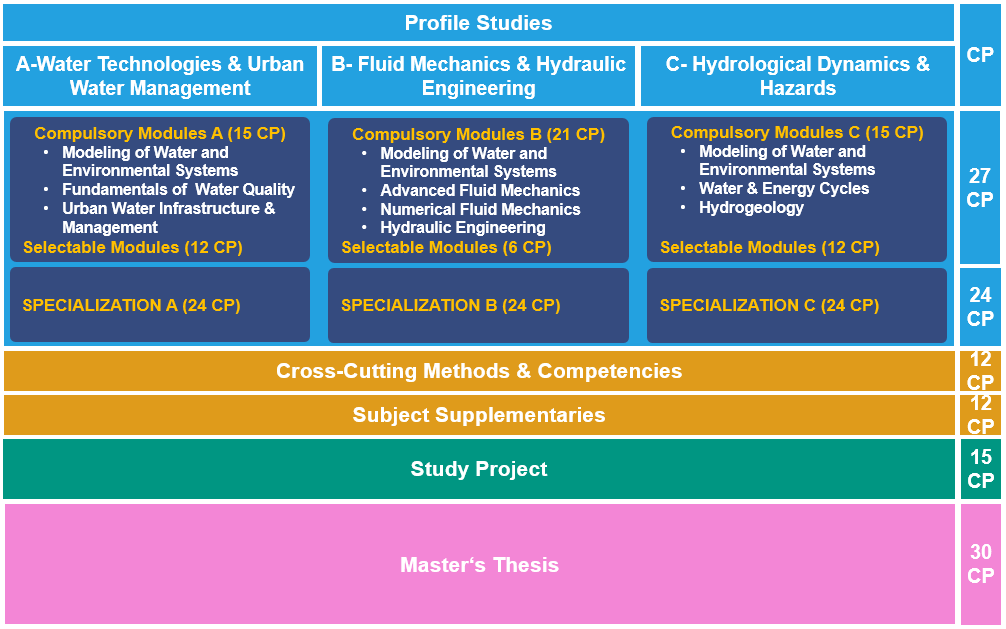Structure of the Master's Degree Program
The master's degree program Water Science & Engineering comprises 120 credit points (CP) and is structured in the subjects
- Profile studies, P (51 LP)
- Advanced Fundamentals
- Specialization
- Cross-Cutting Methods & Competencies, CC (12 LP)
- Supplementaries, Sup (12 LP)
- Study Project, SP (15 LP)
- Master's Thesis, MT (30 LP)
The expected length of the degree program is four semesters.
Overview on the Subjects
Profile Studies (P)
The degree program provides the opportunity to specialize within the following three areas of expertise:
- Profile A: Water Technologies & Urban Water Management
- Profile B: Fluid Mechanics & Hydraulic Engineering
- Profile C: Hydrological Dynamics & Hazards
Each profile has two compulsory elective subjects: Advanced fundamentals (27 CP) and Specialization (24 CP). In the Advanced Fundamentals, water-related engineering and science fundamentals are taught. All students attend a lecture series on Modeling Water and Environmental Systems. They further choose four subject-specific modules, according to their fields of interest and their selected study profile. The Specialization subject allows students to acquire the competence to link the fundamental and advanced knowledge with engineering applications in their selected profile.
Students choose one of the four profiles until the end of the first semester.
Starting from the winter semester of 2024/25, Profile D will no longer be available. However, students who enrolled before the winter semester of 2024/25 can still choose this profile.
Cross-Cutting Methods & Competencies (CC)
The scientifc education is complemented by a comprehensive education in methods and technical skills. The students select modules with at least 12 CP. In line with the international orientation of the program, also language courses with up to 6 CP can be taken.
Supplementaries (Sup)
Within the subject Supplementaries, all modules not yet selected or predefined in other subjects can be freely selected from the whole course offer of the master.
Study Project (SP)
The students carry out an interdisciplinary study project, which prepares them for independent scientific working and writing, and introduces skills in project management. In addition to the competence of combining approaches from different fields in the context of the project, they acquire abilities for team work and critical evaluation of results.
Master's Thesis (MT)
Students apply the acquired knowledge and methodology to independently plan and conduct a scientific study at the end of the course. They are able to deal with the current state of research, and they are capable to work theoretically and/or experimentally on a complex problem according to scientific standards.
Mentoring
The selection of the modules has to be supervised by a mentor chosen by the student at the beginning of the studies. The mentor has to be a professor of the KIT Department Civil Engineering, Geo and Environmental Sciences or of the KIT Department of Chemical and Process Engineering and has to teach in the selected profile. The form for selecting modules within the "Profile studies", the "Cross-Cutting Methods and Competencies" and the "Supplementaries" is available under the following web page: https://www.wasser.kit.edu/english/117.php. This has to filled in by the student, signed by both student and mentor, and forwarded to the Study Advisor via the mentor for it to be entered into the Campus Management System.

